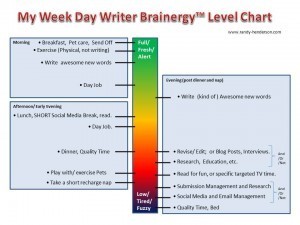Randy Henderson's Blog, page 7
July 26, 2015
Write-a-Thon and Sammy Story Excerpt
All, I have been shamefully neglectful in asking for donation to the Clarion West write-a-thon. Please, go to the website and donate a little something. It supports the creation of a wonderful diversity of amazing future authors. And I’m offering a prize. And now, a snippet from a Finn Fancy-related short story I’ve been writing during the write-a-thon, featuring Finn’s sister Sammy and set in 2003:
Sammy paced the small waiting room between the small sofa and the wall-mounted television, less than eager to confront Bishop Freedom. A unicorn posing as a televangelist. What a frakked up world she lived in.
Of course they had the TV going full volume, the power cord inaccessible and the control panel apparently super-glued shut. Sammy watched Freedom strutting about on stage with his white hair helmet and perfectly even smile.
“… again, what is the greater sin?” Bishop Freedom demanded. “To allow a condom, or to allow easily preventable disease and death? What is the greater sin, to …”
It annoyed Sammy to the point of pissed-offedness that Bishop Freedom used arguments she actually agreed with, given that his true motives were hardly noble.
Sammy pulled out her Palm Pilot, slid an infrared beamer into the SD slot, programmed the PDA as a remote and shut the damn TV off.
It wasn’t that she disagreed with his message, but rather his motives. Unicorns, witches and several other feybloods were well known for feeding somehow on virgins, but less known was that women who’d simply never gotten preggers served them nearly as well. Something about conception, not to mention STDs, changed whatever energy in a woman such creatures fed upon. And two things that had been proven to cause a hell of a lot of pregnancy and disease were bans on contraception, and telling a bunch of horny teenagers to “just say no”. So of course Bishop Freedom condemned the religions and politics that promoted such frakked up policies, but he didn’t do so because they were morally wrong or bass-ackwards in their thinking, and certainly not out of concern for the women; he did so because they screwed with his food source.
June 30, 2015
How to Become a Novelist (Part 1): Write a Novel
Over the next couple of weeks I’ll be posting some info on how to become a novelist. Here’s the first, an infodumpographic and general Q&A on the first step — write a novel.
Why? Well, careful scientific studies have revealed that the number one reason for not having a novel published is, in fact, not finishing a novel. A lot of writers struggle to get past this step, but I hope this information helps.
How big is this mountain I must climb? (How long is a novel?)
Are we there yet? (How long does it take to write a novel?)
How many millions will I make from my books and movie deals?
Seems easy enough, you just … Oooo, cat videos!
Is a novel like a long short story?
1. HOW BIG IS THIS MOUNTAIN I MUST CLIMB? (How Long is a novel?)
Writers and editors count book length in terms of words, not pages, so padding your margins and using a really big font won’t help. LAME!
Average novel length is 75k-120k words, with YA being on the short end, and epic fantasy even longer, and authors who are “too big to fail” writing whatever the heck they want. I’m not saying Wheel of Time books 6-9 could have been seriously condensed, but … well, I guess I am saying that.
Publishers tend to like an average of 90k – 100k for novels aimed at adults. Any bigger and they might cause concussions. And cost more to publish.
Self-published “novels” can also be much shorter and priced cheaply. Some Urban Fantasy/ Paranormal Romance authors seem to do well, for example, publishing 25-40k novellas for low prices on an accelerated schedule, giving their readers new material on a frequent, regular basis rather than full sized novels a year apart. Also, sasquatch erotica is, I imagine, much like actual sasquatch loving — best taken in small doses.
Bottom line, take just as many words as you really need to tell the story you want to tell, in the way you want to tell it, no more, no less. And if it far exceeds the average size, consider splitting it, or take a hard look at what might be cut, or make sure the novel is so amazing that publishers will publish it anyway (based on independent and objective feedback, not your own unavoidably biased opinion).
^Top
2. ARE WE THERE YET? (How long does it take to write a novel?)
About one year seems to be a typical goal for experienced authors with average schedule conflicts (work, family time, etc.). That includes planning, research, writing and revisions. But it varies wildly depending on the type and length of the novel, your writing speed, experience, and writing availability.
A novel a year is also typical for novels in a series, or authors who are trying to build an audience who look forward to regular releases of new material. If you are writing on contract for a publisher, they often want a book a year.
Many authors take multiple years per novel, however. Particularly for first novels, or complex novels, or if you just take whatever time you need to do it the way you want and get it right, like George R.R. Martin or Connie Willis.
Children’s or YA novels may take less than a year. Work for hire novels, such as media tie ins, are also often given shorter deadlines such as 6 months to complete.
Again, bottom line, take whatever time you need (if not on contract). Just don’t let the challenges hold you back.
^Top
3. HOW MANY MILLIONS WILL I MAKE FROM MY BOOKS AND MOVIE DEALS?
Pop quiz: You are a published novelist, and walk into a Barnes & Noble. Do you wear a baseball cap and large sunglasses to avoid being recognized and swarmed by fans, or do you hire bodyguards with some of your novel riches? Answer: Ha ha ha ha (weeping).
If you are writing in the hopes of fame and riches, you are almost certainly going to be disappointed.
Very few authors can make a living writing. It is more often about the joy of writing and seeing others enjoy what you’ve written — certainly, if you want to avoid despair and disappointment, that is what you should be focused on.
But if you can write novels on a regular basis year after year, and sell thousands of each novel, then after maybe 5 novels it will all start to cumulatively add a nice bit of money to your bank account (about as much as a low-medium wage job, though potentially with far more hours).
Advances from major publishers for genre novels by new or emerging authors often range between $4,000 – $10,000 (usually on the lower end of that range) — and remember how can take years to write and sell a single novel?
Advances from small presses tend to be even less. If you self-publish, there are countless factors at play, but the number of self-published authors who make as much or more as traditionally published authors is small compared to the thousands who do not.
I’ll discuss more details of author income in my next post on publishing options.
^Top
4. SEEMS EASY ENOUGH, YOU JUST … OOOO, CAT VIDEOS!
There are a number of challenges to writing a novel that go beyond the obvious need to have a good idea and a general ability to write.
A) Procrastination — there’s obvious things to avoid when you should be writing, such as television and video games (which can be rewards after you’ve met your writing goals).
But you can also fool yourself by doing writerly things that are not writing, when you should be writing: “Research” during writing time (and no, playing Assassin’s Creed is not period research), “building your platform” on social media, managing submissions, rewriting an old story, and generally doing all the work around being a writer rather than writing. These things are all necessary, but in their right time (i.e., after you’ve written).
See my post on Brainergy and maximizing your writing time.
B) Self-doubt — Sometimes, the real reason for procrastination is a lack confidence. The writer keeps delaying to wait for “inspiration” or a better idea, or getting stuck because they don’t want to use up their “special” idea yet though it is the perfect one, or going back to rewrite what they’ve already written each time they learn some new lesson on writing (keep hitting the reset button and never reach the end of their novel).
This results in quitting out of frustration, or constantly reworking a story rather than moving forward and writing something new.
Just push through and finish the novel. You can go back and finish a flawed first draft once it is complete, but you can’t fix what you don’t write.
C) Hubris or denial — believing you don’t need to follow the general rules of what makes a good story or commercially viable novel. Believing you don’t need feedback or professional editing. Believing that the consistent feedback to change some major aspect of your novel is simply due to their inability to understand your genius.
Yes, you can experiment, and you should definitely avoid clichés and stereotypes, but you also first have to understand what works and why if you hope to experiment without creating a bad reading experience.
D) Chasing trends rather than your passions — Novels take time to write and sell. Trends change in the meantime. Most importantly, writing to someone else’s tastes makes writing feel more like hard work than writing to your own.
^Top
5. DON’T STOP BELIEVIN
Again, not finishing a novel is the number one cause for not having a published novel. So how do you keep the faith and keep writing, especially through the terrible middle of the novel, and all the setbacks or challenges?
A) Write what you love. Don’t write vampire YA because vampire YA is hot if you don’t absolutely love vampires, and YA. Write something you would be passionately excited to buy and read. That will help carry you through, will make the writing exciting for you, and will show in the results.
B) Remember that there is no better way to learn to write great novels than to write novels. Even if this novel doesn’t sell, it was not time wasted, any more than practicing piano or dancing for a year would be wasted. At the end of that year, you will be a better writer than when it began, and certainly know more about writing novels. Finishing a novel gives you practice at all parts of a novel. And of course it just might turn out as great and amazing as you hoped it would be when you started.
C) As soon as you finish your novel (well, after the happy dance), start working on your next project (and unless the novel is already sold, don’t make that next project a sequel to the novel you just finished unless you have a guaranteed publisher for it). Being excited about and invested in your next project is one of the best ways to ease the stress and pain of whether your last novel is going to sell or not.
D) Know Thyself. Set realistic writing goals that lead to small successes rather than failures. Strategize to avoid procrastination or despair. Write first; do revision, research, platform building etcetera when you can’t write/ after meeting writing goals. Read the last bit you wrote to prime yourself. Feel free to skip ahead to write a scene you’re excited about. Work on multiple projects and write what excites you now.
E) Perhaps it is time to move on. Sometimes, quitting is the best thing you can do if the novel really isn’t working out. It is hard to let go of something we’ve invested time and heart into, but are you really moving forward as a writer, or stuck in a quagmire? Just make sure you are quitting because you can’t move forward in a positive direction that might result in a publishable work, and are not just quitting because moving forward is hard.
^Top
6. IS A NOVEL LIKE A LONG SHORT STORY?
Yes and no. They differ in several ways:
A) Number of Characters and Plotlines
A short story should focus on one, maybe two main characters. And it should have one major plot, and sometimes a minor subplot that interweaves with the main plot.
A novel can have multiple Point of View characters or a large ensemble cast of characters from a single point of view, and can interweave multiple plotlines and subplots.
In both cases, it is always most satisfying when the subplots add emotional depth and tension to the main plotline, and come back to present a twist or clever resolution to the main plot.
B) Commitment and Test of Will/ Faith
You can write a short story in a day (though for most folks and most stories it takes longer). You quickly get the satisfaction of completing it, and can get feedback on it shortly thereafter. And if lucky, you can get it published fairly quickly, or at least collect the rejections quickly and move on.
A novel, as noted, can take a year or more to write, years to sell and see published (if you go the traditional route), and requires a greater commitment and willingness to risk writing something that may not sell. You will be living with the same characters and world and plotlines for a long time — perhaps a decade or more if it is a series or the Chronicles of the Codex of the Ology Wars (which is again a reason to write to your passions, not trends).
C) Flexibility to Experiment vs Ability to Dig Deep
Since short stories are so much less of an investment in time, you can risk greater experimentation. Try different styles and voices. Try different genres and subgenres. Practice writing characters of other races, genders, orientations, identities, abilities. Try first versus third person, past versus present tense, made up languages, etc. This experimentation will help you to find what you enjoy writing, and will make you better able to choose the best idea, voice and style, characters and setting for your novel.
With novels, on the other hand, you can really dig deep into the characters and the world you have chosen, spend time with them, and explore their natures and complexity in ways you cannot in a short story.
D) Length obviously, though this affects not just the word count, but also the period of time the story actually covers.
The extra characters and plotlines and ability to dig deep means more words, obviously. But novels may also span more time in a satisfying way that, in short stories, can lead to feeling ungrounded or unsatisfied.
Novels can span days or months or years, or even centuries. But short stories should typically take your character over the greatest emotional distance in the shortest amount of time, often a span of hours or days (with exceptions, of course).
E) Exploration of Themes and Metaphors and Deep Stuff Like That
A short story can often represent a single important theme or message. Novels can explore a theme from many sides, or multiple themes, with much more depth and subtlety and complexity. Don’t worry if you haven’t figured out the deep stuff up front though, you will often discover it in your own work as the story evolves or you go back and read the first draft.
7. I FINISHED! NOW WHAT?
Excellent question! And one I will answer in my next post, How to Become a Novelist part 2: Publishing Options
^Top
Feel free to leave comments and questions.
June 21, 2015
Clarion West Write-a-Thon 2015 Edition
It’s that time again!
You want great fantasy and science fiction? Help support the development of future writers. Knock knock. Hello. My name is Randy Henderson. I’m asking for donations to Clarion West, a totally awesome intensive writing workshop for speculative fiction that has been called a “boot camp for writers.”
BUT WAIT, THERE’S MORE. For the first 10 people who register with the Carl Brandon Society (at http://carlbrandon.org/ as a paying member), announce it and let me know about it, I will donate $10 each to the Clarion West write-a-thon on your behalf. The Carl Brandon Society supports and increases the representation of diversity in our genre’s content, creators, and fans, and offers a scholarship every year to an attendee of Clarion West, so it is a great way to ensure your donation dollars produce the maximum benefit.
http://www.clarionwest.org/members/randyhenderson/
May 27, 2015
San Andreas the Oscar Contender
WHAT? I looked at the critic reviews for San Andreas on Fandango and was surprised to see this as the first review:
“The film is so unusually moving and penetrating because it refuses to cloud its emotions in distancing irony, anger, or nihilism.”
WHAT? Is this movie completely more interesting and deeper than I assumed? ::Scrolls through more reviews:: Oh. Nope. Fandango is showing reviews for Sisterhood of Night on the San Andreas page by accident. What a DISASTER! And totally Fandango’s FAULT for misleading me! (HA! Get it? Disaster? Fault? Oh man, I slay myself). But seriously, I’m sure this will be an incredible emotional journey exploring the human condition and explosions and shite. So I was inspired to create an updated movie poster.
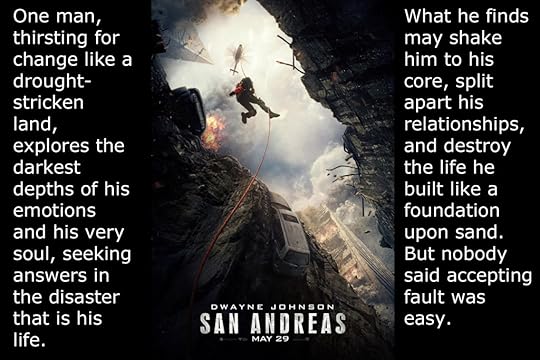
Only the Rock could truly explore the depths of the San Andreas.
May 23, 2015
Finn Fancy Book Tour Wrap Up
Here finally is a wrap up of my book tour experience for Finn Fancy Necromancy — the good, the awesome, and some lessons learned — not only to say thank you to everyone who helped or attended, but also to maybe help those who are trying to plan their own book tour. This is way overdue, I know. And I’ll do a separate post about promotion in general.
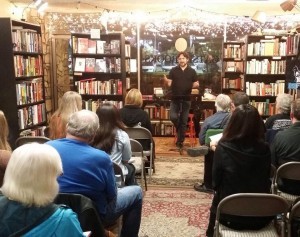
Randy at Gatsby Books, LA
I figured I’d talk about how I set up the tour, how I promoted it, then share some pics, and a list of the bookstores.
SETTING UP THE BOOK TOUR
First off, I must say that on the Tor side, my editor, assistant editor, and publicist were all incredibly supportive, and responsive to all my requests and questions. Seriously, I could not have asked for a better team championing my book.
And I also would have epicly failed at some of this without the help of my partner and not-so-secret weapon, Christy Varonfakis Johnson, who reminded me to do all the things I would have otherwise forgotten as I ran around being distracted by shiny objects, gave me feedback on my reading performances, made me look twice as thoughtful and together as I actually was, and was the genius behind ordering the delicious cakes from Borracchini’s Bakery.
And of course lots of friends helped in lots of amazing ways for which I am eternally grateful.
But bottom line: nobody is going to care as much about getting your story into the hands of readers as you.
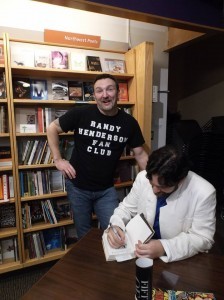
Randy in his Miami Vice outfit signing for his biggest fan
I actually did not expect much in the way of support for a book tour since I was a debut author, and FFN was not one of those rare debuts with huge critical buzz or a large advance investment by the publisher. But I really wanted to get out there and connect with folks. So I decided I would just tour down the west coast on this first tour, to ensure the time and cost were something I could afford to invest.
So before Tor even assigned me my official publicist, I did the research myself on potential reading venues, and put together a proposed itinerary. I provided my proposed itinerary to my publicist once she was assigned. She then contacted all of the bookstores on my list to see if they wanted to book a reading.
Most of the independent bookstores happily booked me, those places where the discerning specfic reader goes to get their fix, such as: University Bookstore Seattle, Third Place Books, Eagle Harbor Books, Powell’s, Borderlands, Mysterious Galaxy, Avid Reader, Village Books, etc.
In general, however, Barnes & Noble didn’t want to risk scheduling readings for an unknown debut author for fear of low turnout. The one Barnes & Noble that did schedule me was one I reached out to myself, as I had an established relationship with their customer relations manager having read there on my Writers of the Future tour.
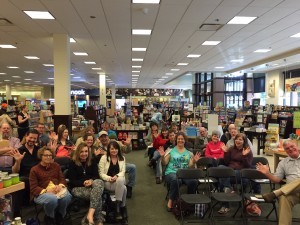
An awesome group of folks at Barnes & Noble Kitsap Mall
When there is a reading, the bookstore must order enough books to sell to anyone who shows up, and of course spend some time and money promoting the event. And you are taking a slot that someone with potentially more sales might take. So big chain stores are less likely to be open to new or less established authors. Or they may book you, but as part of a group reading or signing with other debut, independent or self-published authors, an option I did not explore as I ended up with a full itinerary as it was.
In addition to doing the work of actually contacting and scheduling the bookstores, Tor was very generous in offering to cover many of the costs of my tour, perhaps because, again, I had an itinerary in place and had intentionally planned it up front to be as low cost as possible — driving rather than flying most places, and staying with friends rather than at hotels when possible, etc.
PROMOTING THE TOUR
Once the tour was booked, the next step was promoting it. Tor did a number of things to promote the book itself outside of my book tour, but generally speaking it is up to the author and the bookstores to promote the readings.
Most bookstores will do some combination of putting the reading on their website, listing it in the arts section of the local newspapers, including it in the emails sent to their email subscribers, and of course posting about it on social media.
If you Bingle for your reading and don’t find any mention of it online at least a couple weeks before the event, it might not hurt to send a polite email to the bookstore asking in what ways they are able to help promote it. And if you have a publisher who will signal boost on your behalf, that is nice as well. Tor would generally retweet the announcements from the bookstores about my readings, which was great.
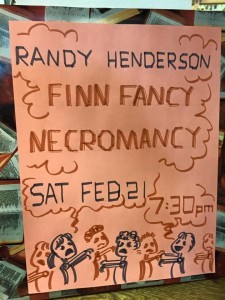
The hand drawn sign from Avid Reader for FFN which I find totally cute for some reason.
Still, only in a couple of places where the bookstores had clearly done a great job of either promoting the event itself or building a core of loyal customers who attended such readings were there a number of people who attended through no effort on my part.
Ultimately, 90% of the people who attended most of my readings were people I personally invited via Facebook Events, or email, or were from workshop and writing groups I had some association with, or were accompanying those people (in addition to friends and family of course). And for one “local” reading I did manage to throw up flyers in libraries, used bookstores and postal stores, which I think might have pulled in a couple of people.
The other time I saw a large number of unfamiliar faces was at the SFWA reading, where I read with Scott James Magner and Mark Teppo. This is one of the advantages of doing a joint reading, in that the other readers have also promoted the reading, and some of the folks who come to see them read might enjoy your work as well.
Group readings = fun and beneficial. Group signings without a reading = you possibly sitting around while the person next to you signs a bunch of books.
However, by the time I got to Norwescon, a couple of months after my book launch, I was seeing an almost even balance of people I knew, and people I did not, for two reasons: first, because most the people I knew had already heard me read elsewhere, and second, because the book was starting to get some buzz around it from reviews and word of mouth outside of my own promotion efforts.
And as much as I love my friends and would love to see them every day of the week, it is in fact a great and amazing thing to see strangers at your readings. So maybe by the time I go on tour for Book 2, even more people who I don’t know will be showing up at my readings as well. And then we can become friends too!  Though I will not go with you to a secluded cabin in the snowy woods. Probably. Though stranger things have happened.
Though I will not go with you to a secluded cabin in the snowy woods. Probably. Though stranger things have happened.
What I ultimately found was that I never seemed to have enough time for promotion. Perhaps I just needed to be better organized, I don’t know, but when you are promoting the book, and working your day job, and writing your next book, and living life, it is hard to remember to promote your readings too.
So while I would create a Facebook Event in advance, I was pretty terrible about following up both generally, and with individuals, as the readings drew closer. And once the readings began, it seemed I was always focused on the next couple of readings and didn’t have time to do anything about the readings next week or next month. As I mentioned, I would have done even worse without Christy’s help and reminders.
So the better you can plan out promotional reminders and efforts ahead of time, the better. And if you are promoting a reading in a city not your own, where you perhaps do not have a large number of friends to help boost attendance, you need to build up contacts and a plan well in advance so you have time to coordinate support in that city — friends, or fellow writers, who might be willing to put up flyers for example, or can spread the word to local writer and fan groups, etcetera. I certainly did not do enough of this.
But, soon enough the book tour was all booked, and I’d done what I could to promote it. All that was left was to arrange my book launch.
BOOK LAUNCH PARTY
Finn Fancy Necromancy was published by TOR in the US on February 10th, 2015. I had my book launch party that same day.
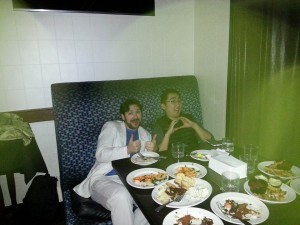
Randy and Yang Yang hanging at the Finn Fancy book launch after party
Books often launch on Tuesdays, or weekdays. So keep in mind that if you want to have a launch party the day of your actual book launch, people may be coming after a long day of work, and have to work the next day, and you will have to tempt them to face traffic and abandon the comforts of home to come hear you read.
I had my publicist book the date with University Bookstore in Seattle, at no small prompting from the bookseller superhero Duane Wilkins. I then called and reserved a side room at the District Lounge around the corner from the bookstore (where drinks and food would be available for order), and pre-ordered a couple of fancy cakes for the after party (at Christy’s suggestion). Note that if you’re having cake at a restaurant, remember to ask if it is okay first, and some may charge a “cake cutting” fee or similar.
I also purchased some giveaway prizes, and planned to have an 80s costume contest at the reading (due to the heavy 80’s nostalgia in Finn Fancy).
Lesson learned: I mentioned the costume contest in the Facebook Event, but people often don’t read all the details of those things, just the headline, date/time and location. Or they may skim it at best. So only a few people even realized the event was a costume party and showed up in 80s attire. Next time, I will be sure to call such details out and remind folks separately from just listing it in the event description.
THE TOUR ITSELF
The book launch was AWESOME! Due mostly to all the amazing people who showed up. Attendance was around 50 people, and a ton of books were bought and signed. To this day I feel an incredible rush of gratitude, and disbelief, at how lucky I was.
I dressed Miami Vice style, and a few other people got into the 80’s spirit as well. And the after party was a success, though I was in a bit of a daze.
And the tour went pretty dang well. I had “better than average” attendance for a debut author at nearly every bookstore, the most notable exceptions being a couple of local locations I utterly failed to promote until the last minute, and one that was the same day as Emerald City Comic Con. So, you know, try not to book a reading at the same time everyone is going to be somewhere more exciting, or book too many readings in the same general area.
For most of my readings I read from the opening of the book, though later switched to chapter 2 with some introduction beforehand because I love the characters you meet in chapter 2. You want to make sure whatever you read, the audience can understand what is going on, and will care. If you just read an action scene from the middle of your book and we don’t know who the characters are, we aren’t going to care what happens to them.
I also left plenty of time for Q&A (without going over my hour), and offered small prizes for attending and for first or best questions, etcetera.
General rules of thumb: keep it moving, keep it fun, and start and end on time.
As for the signings, what an amazing experience. I met a ton of great people. If you are doing a signing, remember to always ask how they spell their name — even “Joe” could be Jo or Djao. Always put the date. Make sure you have an “author” signature that is easy to do (you will be signing a LOT of books), and isn’t the one you use to authorize your credit cards. And have hand sanitizer for after you shake all those hands, just in case someone has a cold and doesn’t runny knows it. Finally, have a quote from your book handy. Apparently, some people just want you to put a quote and your signature.
AND NOW, MORE PHOTOS!
BOOK LAUNCH PARTY – UNIVERSITY BOOKSTORE AND DISTRICT LOUNGE
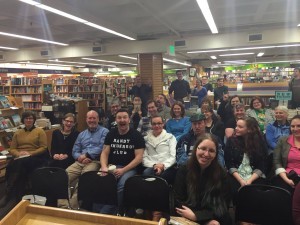
Finn Fancy Book launch crowd (left half)
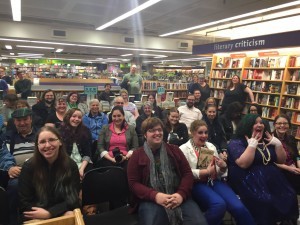
Finn Fancy Book Launch crowd (right half)
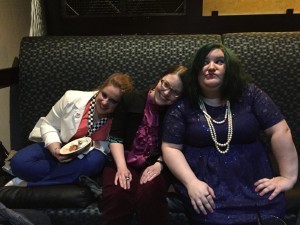
Veronica LeCocq, Emma Epps and Rachel Davis dressed 80s style!
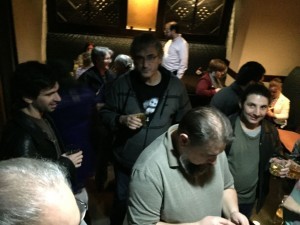
Party at the District Lounge. Scott James Magner jumped in and cut the cakes, because he’s thoughtful like that.
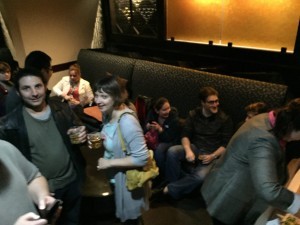
More party at the District Lounge
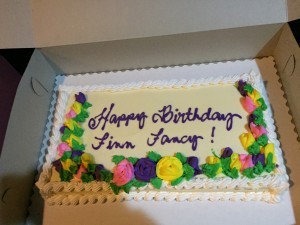
80s style birthday cake. Old school. With cream cheese icing. The chocolate cake was amazing too!
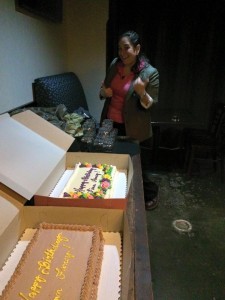
1980s Christy, hostess with the mostest, prepares the cakes for epic nom-nomage.
KIRKLAND, WA — SFWA READING AT WILDE ROVER
It was a great reading with Scott James Magner (who read from his novel Homefront using voices!) and Mark Teppo (who, I believe, read something from the Mongoliad series).
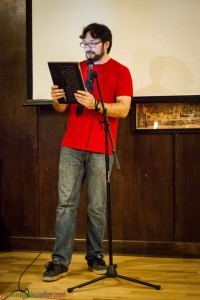
Randy at the SFWA Kirkland reading
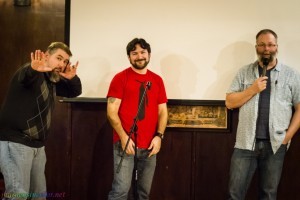
Scott James Magner, Randy Henderson, and Mark Teppo at the SFWA reading in Kirkland
PORTLAND, OR — POWELL’S
Thank you Portland and Powell’s for a lovely visit and fun reading. Everyone signed the small book standup Powell’s made me while I signed their books, but alas I kept forgetting to have people sign it at the subsequent readings, otherwise it would have been an awesome memento of the entire tour. I’ll try to remember to do this next time.
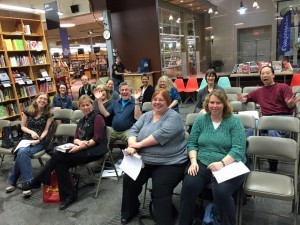
The crowd gathers at Powell’s, including Shannon Page, Mark Ferrari, Tina Connolly, Curtis Chen, and Rebecca Stefoff. Alas, I cut off the people to the right, including Sharon Joss, who went on to succeed me as Grand Prize winner of Writers of the Future. Had I known, I might have passed on the tiara at the reading.
And thank you to Shannon, Mark, Curtis and Tina for being wonderful Portland hosts.
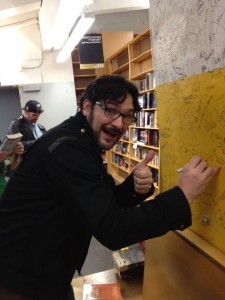
Randy signs the Author Post at Powell’s.
CALIFORNIA BOUND
From Portland, I planned to take the magic portal to California. But I ended up taking a plane.

The magical traveling portal. Alas, it was glitching, sending everyone to Kansas, so I chose to take a plane.

I did not expect to walk outside and climb aboard a prop plane for my flight to Sacramento. I mean, if any plane was going to mysteriously disappear with me aboard it would definitely have propellers.
DAVIS CA — AVID READER
Davis reading.
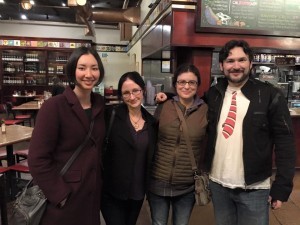
Andrea Stewart, Megan O’keefe, Tina Smith and Randy. Four Writers of the Future first place winners (two also golden pen winners) all together to share interesting words and delicious crepes.
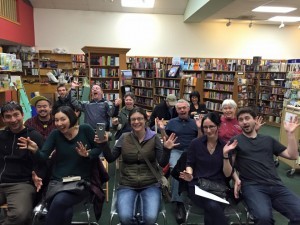
Avid readers
SAN FRANCISCO – BORDERLANDS
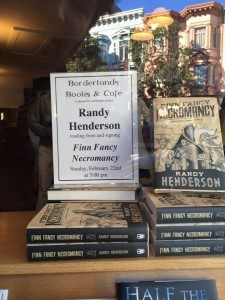
This looks interesting! I think I’ll check it out!
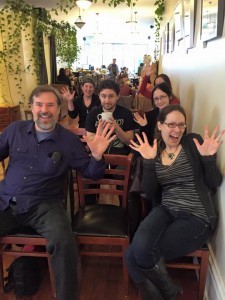
Gathering crowd at Borderlands. I had a blast and really appreciate everyone who made the trek into the Mission District, including Cliff Winnig, Joey Hewitt, Megan O’Keefe and Amy Sundberg.
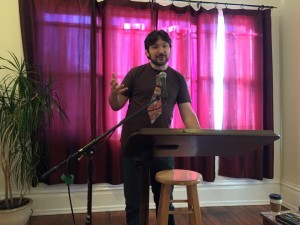
Randy reads at Borderlands in SF
After the reading, Megan and Joey took me to a genuine speakeasy, with passwords, hidden rooms and all.
Also, lesson learned: not to make assumptions about which Bay Area location people will attend based on where they live.
SAN DIEGO — MYSTERIOUS GALAXY BOOKSTORE
I left Mountain View after my reading at BOOKS, INC, and after a celebratory post-reading dessert with the always gracious Amy Sundberg, and drove to San Diego. Along the way, I passed many obstacles.

I passed the Arcana Ruling Council’s secret pyramid base

Laser turrets rose up and fired at me but I drove in evasive pattern Riker Three and made it through.
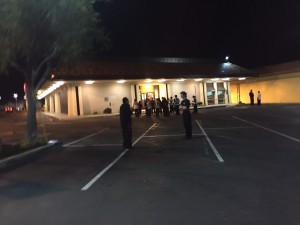
Finally, I had to fight my way through a martial arts gang in the parking lot to reach the bookstore. Luckily I’d just had manicotti and so was full of chi-z. (Whatever. It was funny in my head.)
Anyway, I made it inside to find folks gathering, including eccentric gamer genius Noah. Had a blast reading, and was amazed and grateful for the huge triple stack of books going out to Fantastic First and online order folks. Thanks Mysterious Galaxy!
Also thank you to Jim and Wendy Varonfakis for the manicotti! And to Mark Yturralde for sending me info on a M.U.L.E. emulator after I waxed nostalgic about my Commodore 64 days.
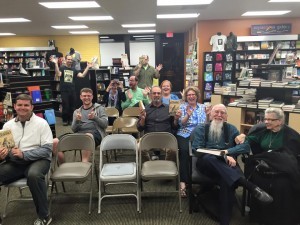
Mysterious Galaxy draws in some loyal readers after Randy fails to properly promote the event. Lesson learned, and thank you MG!
LOS ANGELES — GATSBY BOOKS AND LAST BOOKSTORE
The Last Bookstore was an incredible and huge space (as evident in the pics), but just as impressive was Gatsby Books, whose owner Sean Richard Moor has created a charming community space where you can walk in and be recommended just the right book. I loved both bookstores, and was grateful for all the folks who came to hear me read and speak, particularly Christine Marie Bryant for her support. And it was great to see the folks from the Writers of the Future staff again.
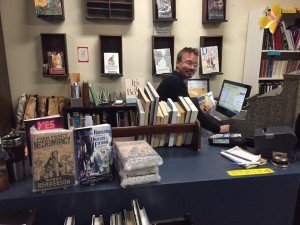
The fearless founder of Gatsby Books
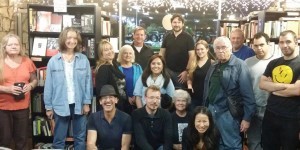
The awesome crowd at Gatsby Books

Last Bookstore
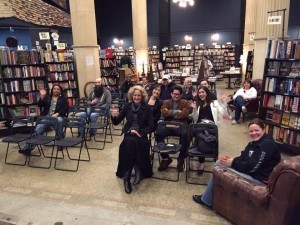
The crowd gathers at the Last Bookstore in LA

Last Bookstore

Last Bookstore

Last Bookstore

Last Bookstore

Last Bookstore
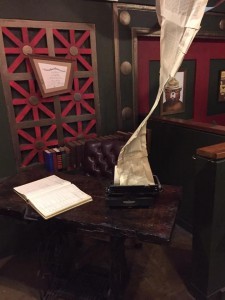
Last Bookstore

Last Bookstore
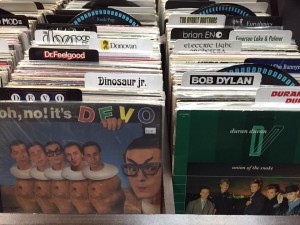
They had vinyl! Thankfully they were charging top prices for it all or I would have had to ship a couple boxes home. But browsing through 80s LPs was a perfect way to prep for my reading.
THIRD PLACE BOOKS, LAKE FOREST PARK
I returned to Washington, and soon after had a reading at Third Place Books in Lake Forest Park. My host turned out to be Lish McBride, which was awesome because she also has a humorous series featuring a necromancer, though it is YA, the first book of which is titled Hold Me Closer Necromancer.

Back in Seattle! The thing is, people really love their cars. “But if you give them good music, good coffee –” Nope. Still no Super Train. Sigh.
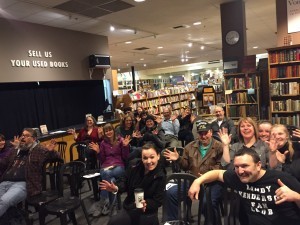
The crowd at Third Place Books in Lake Forest Park. Lish is peeking out from the back.
And I finally wrapped up my tour at Village Books in Bellingham (alas, no photos).
THE BOOKSTORES
Thanks again to these awesome bookstores! I fully encourage you to support them. They are so important to the living breathing genre community in their area, and to spreading the love of our genre to new readers.
University Bookstore – SEATTLE
4326 University Way NE
Seattle, WA 98105
______________________________________
Mysterious Galaxy – SAN DIEGO, CA
(NEW LOCATION!) 5943 Balboa Avenue, Suite #100,
San Diego, CA 92111
_____________________________________________________
Village Books – BELLINGHAM, WA
1200 11th Street
Bellingham, WA 98225
______________________________________________________________
Borderlands – SAN FRANCISCO, CA
866 Valencia St.
San Francisco, California 94110
_________________________________________________________
Powell’s Books – BEAVERTON, OR
(Cedar Hill Crossing Location)
3415 SW Cedar Hills Blvd
Beaverton, OR
______________________________________________________
Third Place Books – LAKE FOREST PARK, WA
Lake Forest Park Town Centre,
17171 Bothell Way NE,
Lake Forest Park, WA 98155
______________________________________________________
Liberty Bay Bookstore – POULSBO, WA
18881 Front St NE
Poulsbo, WA 98370
______________________________________________________________
Eagle Harbor Books – BAINBRIDGE ISLAND, WA
157 Winslow Way E
Bainbridge Island, WA 18049
______________________________________________________
Avid Reader – DAVIS, CA
617 Second Street
Davis, CA 95616
Additional Info: Reading/Q&A/Signing for Finn Fancy Necromancy
______________________________________________________
Books Inc. – MOUNTAINVIEW, CA
301 Castro Street
Mountainview, CA 94041
_____________________________________________________
The Last Bookstore – L.A.
453 S Spring St
Los Angeles, CA 90013
_____________________________________________________
Barnes & Noble (Kitsap Mall) – SILVERDALE, WA
10315 Silverdale Way NW
Silverdale, WA 98383
______________________________________________________________
King’s Books – TACOMA, WA
218 St Helens Ave,
Tacoma, WA 98402
April 14, 2015
My Reddit Fantasy “Ask Me Anything”
I have an “Ask Me Anything” session on Reddit’s /r/Fantasy forum!
http://www.reddit.com/r/Fantasy/comments/32kpyr/look_its_fantasy_author_randy_henderson_ama_style/
March 31, 2015
My Norwescon Schedule 2015
Hey all! I’ll be at Norwescon this weekend, hope to see you there!
Here’s my scheduled events (not including individual workshops):
Reading
Cascade 1
Saturday 1:30pm–2:00pm
“Finn Fancy” Fun Time with Randy – Randy will read a bit from his new novel from TOR, titled FINN FANCY NECROMANCY, do a little dance (Q&A), make a little love (PRIZES!), and get down tonight (TREATS!). Finn Fancy is a dark and quirky contemporary fantasy set in Port Townsend, with sasquatch mercenaries, mobster gnomes, and more. Randy might also read something new, demonstrate miraculous powers, or at least juggle. It’s not just a reading, it’s Finn Fancy Fantastic Fun Time!. Rated PG
Panel: Character Arc, Plot Arc, Story
Evergreen 1&2
Saturday 5:00PM-6:00PM
Knowing how your plot and characters change as the tale moves forward helps a writer to craft more powerful stories. What makes a great character arc, and how can you make your character’s internal change more compelling? What makes a great plot arc and how can you intertwine it with your character?
Nina Post (M), Randy Henderson, Craig English, Nancy Kress, Alex C. Renwick, Susan DeFreitas
March 3, 2015
Reading Tempest’s Challenge as a Writer
I haven’t weighed in on Tempest’s challenge because others said what I would have said quite well.
But this morning as I read yet another bit of concern over it, I realized that many people who are reacting to it are writers (and many who are reacting negatively are white male writers who fear this is an attack on their writing and/or livelihood), and for writers, there is an obvious solution: treat it as a writing critique.
If someone tells you that there’s something wrong with your story, you should not take it as a condemnation of who you are, it is a critique of the problems in the story.
Sometimes the critique is more about the critic’s own tastes or how they would write the story, and doesn’t fit your story. Most often, the critique points out a valid problem with your story, but the critic goes one step further to suggest a specific fix that doesn’t really fit what you want to do with the story. But their suggestion is just that, a suggestion. And most importantly, just because you disagree with their suggestion doesn’t mean there isn’t an issue that needs to be addressed.
If one person points out a problem but nobody else seems to have noticed, maybe it isn’t a problem you need to address. But if the vast majority of people who read the story all agree on the same problem, then it is one that needs to be addressed — even if it requires you to change something you feel incredibly attached to in the story — and you just have to figure out how best to do so, in a way that fits your tastes and your goals with the story.
Not a perfect analogy, mind you, and I may be opening myself up to a bunch of ad hominem attacks and people focusing on some specific imperfection in the analogy rather than the larger point, but I hope it is a useful analogy nonetheless.
Tempest did not come in and try to steal your story. She did not try to edit it herself without your permission and dictate how the story must be. She made several suggestions for how we might fix a major problem in the story — not even unique suggestions, but suggestions based on what others have suggested and done themselves before, and proved to work. You can choose to take those suggestions, or not. But either way, the problem her suggestions highlight is very real, and needs to be addressed if this story is going to be a truly good story and enjoyed by all.
So look at the problem, and decide how YOU want to best fix the story.
For my own part, I fully support accepting Tempest’s challenge. In fact, when I won Writers of the Future, I used my acceptance as an opportunity to give a five minute speech about the value of diversity in our genre and the power of story to allow us to experience lives unlike our own. I specifically encouraged people to seek out diverse voices like NK Jemison, Nalo Hopkinson, Nnedi Okorafor, and Nisi Shawl.
And I still feel that way, even with my own debut novel just released.
But for me that is, ironically, also a decision that comes somewhat from privilege, because I am not currently financially dependent on my writing (though it certainly helps), and not too concerned about whether the performance of my debut will make or break my writing career (though I have all the natural fears of a writer in today’s uncertain publishing world).
But even so, from a practical standpoint, I know that not everyone will accept the challenge outright. Some already read diversely. Some will balance reading books chosen specifically for a diverse viewpoint with books by authors they love, or friends who don’t necessarily fit a single category. Some will simply feel it unnecessary or even hostile, though I obviously would disagree.
Don’t get me wrong. I also recognize there are a lot of decent and kind debut or struggling authors out there who legitimately fear their dream will die or become unrealistically difficult if nobody buys their perfectly wonderful debut book, or who desperately need the income book sales bring them. I don’t feel their concerns are any less valid than the concerns that prompted Tempest’s challenge. Different in scope and history and level of negative consequences, yes, but no less valid. One does not negate nor trump the other.
We are complex. We contain multitudes. You can have two conflicting desires, such as to support diversity but also want your book, the child of your dreams and years of hard work, to do well when you send it out into the world, and I think that is normal and okay.
What is not okay is to be a jerk about it, or to react out of fear and lash out, to take a suggestion as some kind of dictate or call to punish. Any more than it is okay to take someone making a legitimate suggestion to fix a real problem with your story, treat it like a personal attack, and lash out at the critic who is, in the end, just trying to make your story richer and stronger, someone trying to help you grow as a writer and help your story to reach a much wider audience.
And frankly, that is exactly what reading diversely can help do for your writing, and you as an individual, as well.
January 26, 2015
Using Your Writing Brainergy Wisely
Brainergy. It’s not a new agey thing, or a result of midichlorians. It’s just my word for measuring how fresh and alert and energized my brain is feeling. And I believe learning to organize your writing schedule around your brainergy is very useful for writers.
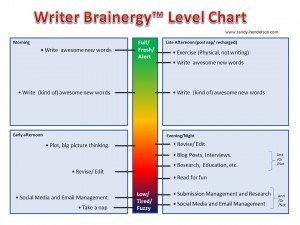
Basic Writer’s Brainergy Chart
Alas, I am not independently wealthy and writing this from my Super Writer Cave hidden beneath stately Henderson Manor. I have to work full time, and I try to spend quality time with the people (and pets) I like. I also have myriad other little life distractions.
So people sometimes express surprise at the amount of writing that I get done (not that I’m anywhere near Jay Lake levels or anything). And it isn’t just the writing, of course, but the fact that I actually find time to finish and polish and submit my writing, and do all the other work that goes with being a writer.
One of the tricks I’ve learned to do so is to not simply make a to do list of things I want to get done, but to schedule them, and more importantly, schedule them smartly.
Basically, I order my tasks by brainergy level required.
I write new words when I am freshest, because creative writing requires a lot of brainergy. Everything else, I prioritize lower, depending on a combination of how important it is, and how much brainergy it requires.
It is so tempting to get distracted by social media and emails, by research and “research,” by the administrative tasks that seem important. The thing is, these things are generally not as difficult as crafting a story out of the air can be, so it is easy to be tempted toward doing them instead of writing.
By setting specific times to do those less important tasks, and by valuing and protecting those precious hours of high brainergy for my writing, I get my writing done.
So I’ve created a couple of pictures to try and illustrate roughly how I prioritize my brainergy during the week and on the weekends, in case you might find it interesting or useful.
They do not reflect of course the more subtle variables in writing. For example, I might be in heavy revision mode on a novel and spend the “Writing Awesome New Words” periods actually doing mostly revision for a week. Or I might spend a period focused entirely on plotting out the next novel during my writing hours.
But generally speaking, a writer should always be writing. Even if you have finished the first draft of Project A, you should ideally be working on the first draft of Project B while you are revising Project A (deadlines notwithstanding).
These pictures also do not reflect the realities of commutes, grocery shopping, caring for children, phone calls, and all the other obstacles and interruptions to your writing time. But if you prioritize your writing tasks and set general times for them, then when chores and challenges arise you can simply push your entire writing schedule back a bit and drop the low priority items off the end. This will still result in getting more writing done than if you simply plan to get some writing done today, at some point, then get sidetracked, and decide to do whatever task comes to mind instead.
Additional information you may find useful:
My SFWA article on setting writing goals and scheduling tasks.
My SFWA article on being a happy writer (which increases your brainergy).
January 2, 2015
Setting Your Goals for the New Year and Beyond
Happy New Year!
Rather than share events from my past year, I thought I’d offer a bit of encouragement and advice to help with the coming year. While this is aimed primarily at my fellow writers, it also, I think, can be applied to life in general.
This weekend, I encourage you to sit down and do three things:
1) Create a calendar/schedule for your goals and tasks.
2) Create, or update, your list of goals and tasks.
3) BELIEVE and do what makes you happy.
SCHEDULE EVERYTHING
One of the things I often do is to make resolutions, set goals, create to do lists, etc. and then get busy doing All The Things (and being distracted by cute animal videos and other interweb evils, etc.) and end the day having done a lot of things that were not actually those things I’d planned.
The solution?
Don’t just make a to do list. Put the tasks on a calendar/ schedule.
Block out specific times where you are going to do each thing. And be realistic about it. Know thyself. Leave yourself time to snuggle, eat, nap, play with the pets, check social media, etc. as well as pad the time to allow for warming up mentally or physically to a task if necessary.
By prioritizing the things you really want or need to get done and blocking out specific times for them on your calendar, they are much more likely to get done, and in the order you want them to get done, than if you just create a list.
CREATE/UPDATE YOUR LONG- AND SHORT-TERM GOALS
Setting specific goals is an important task. It helps you to stay focused on the tasks, and projects, that will actually move you in the direction you want to go, and not be distracted or sidetracked by tasks or “opportunities” that will not. And achieving goals gives you a sense of progress and growth.
I began using this general model horked from Booklife by Jeff Vandermeer, which I highly recommend for additional clarification on setting goals, and other aspects of living the life of a writer.
It basically breaks down like this:
Write a mission statement (who you want to be as a writer).
Translate that into Goals. Write down where you want to be as a writer in five years. Then break those goals down into shorter-term goals and tasks. Some goals break down easily to tasks (breaking a 100k word novel down into word count increments) and can be set up front. Other tasks (managing your inbox, buying printer ink) are also needed but will be fluid, popping up as needed, and so will be managed and updated week to week, day to day.
Update your Goals and Tasks. And you will need to occasionally update not only your short term task lists, but your long term goals as well. Perhaps you realize the goal timeline is unrealistic with your current life priorities. Perhaps you realize working toward that goal is not making you happy and a different goal will make you happier (e.g. you began writing a YA novel because that’s what’s hot, but YA is not your real love). Perhaps you have a life event that requires some adjustment to timelines. Perhaps an opportunity comes up that you decide to seize. Perhaps you achieve a goal and so need to make new ones to replace it.
Some examples are below. These are not my goals per se, but just some examples of the types of goals a writer might set.
Five Year Plan:
Publish at least two books with traditional publishers.
Self-Publish at least one book or story (to familiarize with process/ options).
Won’t pursue or accept commercial/ tie-in novel offers until at least one original novel published.
One Year Plan (what you need to do in next year to be on target for your 5 year goals, update yearly):
Complete new book.
Get agent for new book.
Sell two short stories to pro markets (ideally one set in same world as my book)
Get speaking and reading opportunity at one or more conventions.
Monthly Task List (what you need to do this month to be on target for your 1 year goal, update monthly):
Write at least 20k new words each month on book and short stories.
Complete at least one new short story every three months.
Read at least one novel (alternate between same genre as my WIP and not).
Attend critique group at least once.
Weekly Task List (what you need to do this week to be on target for your monthly task list, update weekly):
Write at least 5k new words on new book/stories.
Post at least one new blog post, and/or at least three original posts across social media.
Submit any completed or rejected stories.
Respond to request for interview by Friday.
Return contract by Tuesday
Daily Task List (what you need to do today):
Write at least 715 words
Resubmit any rejected stories
Clear out inbox
Buy printer paper
Work on interview questions
BELIEVE AND DO WHAT MAKES YOU HAPPY
Writing is a masochistic occupation. It is full of rejection and hard work, usually for infrequent and underwhelming reward. And yet, for me, there is just no substitute for the happiness and sense of fulfillment it brings me, to face a blank page, and out of nothing to create worlds, and lives, and moments filled with drama and dread and joy and magic.
Just remember that setting goals as a writer doesn’t guarantee they will happen, or that your writing will achieve the level of commercial success you wish for.
BUT, if writing makes you happy, then write. And by setting goals, you will improve your chances of success, and you will be able to recognize and celebrate each small success. And the more you write, the better your writing will be, and the more the odds, and number, of successes will be in your favor.
Do not despair at the rejections, or the novel that didn’t work. Focus on your goals, and know that it is only a matter of time until they are met.
And most importantly, you are still writing, and that in itself is pretty dang awesome.
Finally, here’s a link to my SFWA article on how to be happy as a writer for some specific tips on doing so.
Please feel free to share your goals with me. I’d love to hear them and see examples of how other writers work and dream. And it also gives me the opportunity to offer help where I may.
Cheers.




